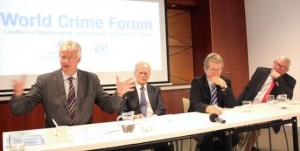
Citizens quickly lose faith in the justice system if they sense laws, police or the courts aren’t fair, criminologists from Europe and Australia reported at a world conference in Australia.
People’s trust is vital for justice
By Dr Kristine Klugman* , CLA President
Legitimacy of the justice system – that is, if citizens believe in the justice system and have trust in it – is vital for social stability and lower crime rates.
People will generally be more inclined to obey the law if they believe the system is fair and accessible, and operates under a stable and sensible ‘rule of law’. Trust and confidence provide political stability and lower crime rates. Due process improves crime control.
These are a few of the memorable facts from a forum held at the Australian Institute of Criminology on 30 October 2013. This year marks the 15th anniversary of the International Society of Criminology, an occasion being marked by seminars on all continents.
The Australian World Crime Forum 2013 took the form of a discussion on how criminal justice systems are perceived. It was led by Prof Dr Stephan Parmentier of the Leuven Institute of Criminology, Belgium. He was joined by a switched-on audience and a panel of eminent Australian criminologists: Dr Russell Smith, principal criminologist with the AIC, based in Melbourne. Prof Rick Sarre of the Uni of South Australia, and Dr Peter Grabosky of ANU in Canberra (pictured, left to right).
Prof Sarre highlighted that ‘law and order’ campaigns flew in the face of an educated electorate. Survey after survey of people’s attitude to sentencing demonstrate that people are not as vengeful as politicians think they are. In contrast to the simplistic banner headlines which predominate in the media, the reality is that, when the details of an individual case are explained to somebody, the person is much more inclined to be lenient, frequently more lenient than the judge has been in real life.
‘Justice Barometers’ were used in the study of European countries to measure the degree of attitudes to and trust in the judicial system – peoples perceptions gauged by quantitative research in a questionnaire of 3200 respondents.
In attitudes to the system, about half were generally positive and half generally negative. Trust seems to decrease with age, but increase with education level, income, and employment. It is lower amongst people with extreme political views, divorced or separated people (particularly women)…and with people who had actually experienced the justice system.
People from Scandinavian countries had generally more trust compared to those from Eastern Europe, who had least. The European study, carried out in 2002, 2007 and 2010, is acting as a baseline survey against which future trends can be evaluated.
The role of media and politically motivated actors (notably politicians on the conservative side of the political spectrum, CLA says) in exacerbating crime levels was discussed.
Crime ranks only sixth, at 5.7%, in the most recent nationwide study of people’s concerns of the ‘most important issue facing Australia in 2011’[1]. The 2009 survey results showed people were most worried about credit card fraud, but credit card fraud occurs in about 0.05% of transactions in Australia, Dr Smith said. Political, police and media hype causes Australians to have a disproportionate fear of certain types of crime.
In Australia, and throughout the western world, crime has been falling for decades. For example, in the period 2001-2011[2], police-recorded fraud, arson, criminal damage, homicide, other theft, thefts from vehicles, burglary, robbery and theft of vehicles all declined by 10% or more, the last three declining by 50% or more. Only assault and shop theft (both up by 10% or more) and sexual assault (up 1%) increased.
Yet the picture fed to the media by police and politicians for their own purposes, CLA says, is vastly different. Politicians want to keep the public in fear, so they re-elect anyone campaigning on ‘law and order’ platforms (which is nowadays both major parties). Police associations (that is, police unions) drive fear of crime so that police numbers continue to increase, ultimately to the benefit of the union officer-bearers and their pay packets.
The cost to the community of responding to crime is rising substantially:
% change cost of responding to crime 2001-2011[3]
|
% |
|
| Corrections | Up 141 |
| Police | Up 134 |
| Federal agencies | Up 119 |
| Victim assistance | Up 113 |
| Courts | Up 85 |
| Juvenile justice | Up 83 |
| Insurance administration | Up 34 |
| Household precautions | Up 29 |
| Security industry | Up 8.3 |
(By the way, funds allocated by governments to support civil liberties bodies remain at precisely what they were in 2001: zero).
Public debate should not be on rising crime, because it isn’t, but on how to rein in the mushrooming cost of dealing with crime, most notably in relation to prisons and police.
The Canberra World Criminology Forum 2013 agreed that qualitative research was needed to interpret why people think the way they do. The research findings could be useful to policymakers (if they use them) to influence how criminal justice systems operate, to assess the effectiveness and accessibility of justice systems, and to increase public awareness and debate of issues, leading to a more informed citizenry with more confidence in police, courts, prisons and the entire judicial system.
The forum was videotaped: inquiries to the Australian Institute of Criminology

